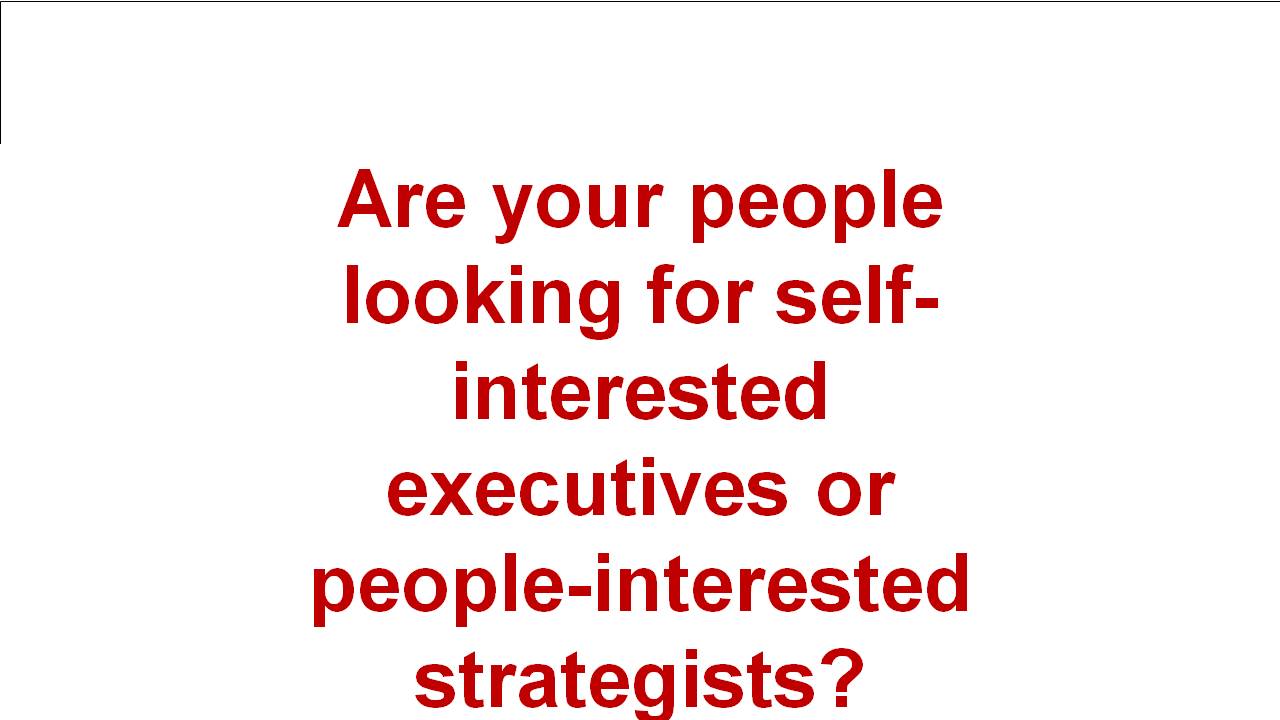by Peter A. Arthur-Smith
“Do we need strategists in key positions to determine and orchestrate an effective way forward, or do we require executives to just efficiently execute what’s required?”

For long enough we’ve just required our “chiefs” to efficiently execute what has been determined by the “boss.” If nothing else, they then don’t have to think too much. They’ve been required to utilize their specific domain expertise, such as chiefs of sales, marketing, operations, finance, IT, etc., to implement their boss’s (CEO’s) vision and strategy – not too many questions asked. Their incentive being, if they can maximize the bottom-line through efficiencies, their bonuses will be great. That may have worked for much of the past century, but it’s increasingly becoming an organizational liability.
As western economies increasingly struggle with a shortfall in wealth, which is why we increasingly spend our time squeezing our ventures for greater efficiencies, so owners and shareholders can still get their pay-off; your venture’s best alternative option, among other things, is to become more effective. You see, effectiveness is more about substantive innovation, ingenuity, people and breakthroughs, while efficiency is more about cost-cutting, short-cuts, numbers and quality expediency. Innovation creates substantive, longer-term wealth, while squeezing produces near-term profitability. Efficiency-think has us going down a rabbit hole!
Executives have often learned to place their domain prowess, as the most “technically” knowledgeable person within their organizations, above their people-leadership expertise. In other words, they become their venture’s domain experts, but fall short on team member – or teamer – engagement. For long enough, this approach has required change so executives become more people-effective. Greater effectiveness is brought about by challenging their people’s minds to contribute ideas rather than sit on the sidelines and admire their executive’s expertise. We should cease expecting our people to leave their brains at the front door!
Conventional executives welcome the advent of AI, because in their mind it will reduce the requirement for “bodies” or “headcount.” With fewer “pairs-of-hands,” replaced by robots, they believe they will be able to move forward faster at less cost than having bothersome people around. Such short-sightedness undermines the prospect of innovation. As for now, AI, with its non-sentient capacity, just doesn’t have the capability for fundamental innovation. AI can only leverage off conceptual ideas already created by humans.
It’s past time to move into the strategist era: where key leaders think through the most effective way of reaching a particular destination. Strategists are not obsessed with goals and their tendency to induce myopia, but rather concentrate on journeys, milestones and destinations. By pursuing effective strategies, they seek more innovative, elegant and enduring pathways to meet their domain’s near and longer-term needs. Since their own minds can only be stretched so far, they shape diverse teams around them to help them think through all their options. They build breakthrough teams and assign “pairs” to help determine fresh ideas.
So, it’s time to wake up and produce a new breed of leader – strategists rather than executives: strategists that can inspire people to utilize their inherent creativity and pursue fundamental innovation. Innovation was apparently abundant in the latter half of the nineteenth century. We also had other spats with genuine innovation after our two world wars in order to rebuild our economies. According to Professor Edmund Phelps of Columbia University and his able team, in their book Dynamism, they show how Total Factor Productivity (TFP) – or indigenous (localized) innovation – has dropped dramatically since the late 1970s within key western economies – including the US. Is this because we’ve been obsessed with efficiency and squeezing out fundamental innovation? Why has it taken us over fifty years to reconsider returning to the moon? Those prior eras produced so much innovation!
A March 2024 New York Times Opinion article entitled How Bad Can It Get for Hollywood ? , pointed out how movie studios “… have moved into an age of brand stewardship and out of the business of generating ideas and developing scripts. They’ve redefined their business as curation rather than discovery.” This trend has been going on a whole lot longer in so many other industries and organizations. This is a prime example of our efficiency obsession.
Strategists will still pursue efficiencies to minimize waste and utilize resources wisely, but that will occur after they’ve found and launched an effective solution. That way society will benefit from a balanced pathway to its needs rather than a self-preservation approach toward doing business. So, if your mindset is purely fixated on cost, numbers, money and sticking with the same old routines, then remain with the executive, efficiency track.
On the other hand, if your intentions are toward innovation, people engagement, elegant outcomes, and longer-term wealth, then you will be calling upon strategists to facilitate more effective outcomes. There’s no doubt which path the majority of people around you will be expecting you to pursue. They instinctively know the difference between self-interested and people-interested leaders?
